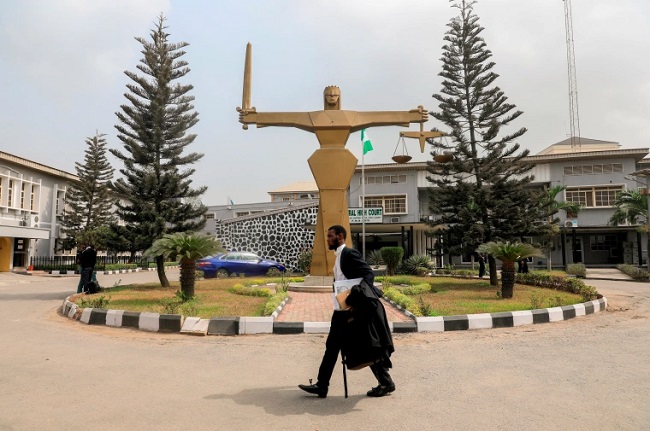The chairman, Judiciary Staff Union of Nigeria (JUSUN) of the Federal Capital Territory (FCT) Judicial Service Committee, Viashima Timothy Tersoo, has declared that the indefinite strike embarked upon by the union is meant to enable Nigerians to have free and fair judicial system and judgments.
Tersoo stated this while commenting on the strike embarked upon by judiciary workers across the country to press for judicial autonomy.
JUSUN General Secretary, I.M Adetola, had in a letter dated April 1, 2021 directed members across the country to commence an indefinite strike from Tuesday, April 6, declaring that, “This is to press home JUSUN’s demands for enforcement of financial autonomy in the Judiciary.”
The NJC JUSUN chapter chairman told Tribune Online that an autonomous Judiciary would positively rub off on the justice delivery system in the country with a view to ensuring that ordinary Nigerians would get free and fair judgments, irrespective of their status and political affiliations.
“JUSUN wants innocent Nigerians to have free and fair judgement irrespective of your status and political affiliation,” Tersoo told Tribune Online.
According to him, the union resolved to embark on the strike as a result of the failure of state governors to implement the judgment delivered by a court of competent jurisdiction on financial autonomy for the judiciary as the third arm of government since 2014.
Tersoo declared that what judicial workers across the country wanted to achieve by going on strike was the independence of the Judiciary, adding that the strike would only be called off when government addresses the issue on ground.
Reacting to the strike, a lawyer and rights activist, Pelumi Olajengbesi, declared that no nation could adequately protect its citizens without an effective and functional Judiciary.
According to him, the ongoing strike would bring difficulty for litigants in the course of pursuing justice due to the fact that the courts would not be sitting.
“No nation can adequately protect its citizens without an effective and functional judiciary. A lot of litigants will go through a difficult time in the pursuit of justice because the court cannot sit.
“Some whose fate of coming out of prisons is in the hands of the court will suffer also,” Olajengbesi to Tribune Online.
He then declared that, “Essentially, it (strike) is not good for our country’s reputation within global communities.”
Though the High Court of FCT is on Easter vacation as of Tuesday when the JUSUN strike commenced, other activities in the courts, including Magistrate’s courts were paralysed by the strike with gates to the courts locked by workers to ensure the effectiveness of the industrial action by JUSUN.
Union officials were seen at Maitama headquarters of the High Court supervising the enforcement of the strike action, thus preventing people who had one business or the other to transact in the court from gaining access to the premises.
The situation was similar at the various division of the FCT High Court, even as a JUSUN official who spoke with Tribune Online on condition of anonymity insisted that no judicial worker would go to work until governments at all levels grant the judiciary its autonomy as being enjoyed by other arms of government.
“We are determined to achieve success with this strike and there is no going back until our demand is acceded to by the government,” he said.
The Nigerian Bar Association (NBA) through its president, Olumide Akpata, had in a statement dated April 5, 2021, lamented the failure of the government to adhere to the provisions of the constitution.
According to Akpata, “the NBA is deeply worried that despite the clear provisions of the 1999 Constitution of the Federal Republic of Nigeria (as altered) which consecrate the autonomy of the Judiciary, the executive arm of government, particularly at the state level, has customarily refused to comply with the provisions of the Constitution, which are targeted at safeguarding the independence of the judiciary.
“The NBA is aware of the judgment of the Federal High Court of 13th January, 2014 which unequivocally confirmed the autonomy of the judiciary in line with the spirit and letters of the Constitution.
“While that judgment was followed by a Memorandum of Understanding between JUSUN and relevant stakeholders under which parties agreed to conscientiously give effect to the judgement of the court, that has not been the case for seven years after the landmark judgment.”
He insisted that the judiciary is an equal arm of government relative to the executive and the legislature, declaring that its independence is fundamental to the effective discharge of its mandate under the Constitution.
YOU SHOULD NOT MISS THESE HEADLINES FROM NIGERIAN TRIBUNE
Cryptocurrency: Understanding The Craze, Threat
ON Friday, February 6, the Central Bank of Nigeria (CBN) rocked the boat with a circular that inadvertently highlighted how popular cryptocurrency transactions have become among Nigerians in recent years, judging by…
ICYMI: Yoruba, Hausa Teachers Needed In US
The US Embassy and Consulate in Nigeria has announced that the services of Yoruba and Hausa teachers are needed in the United States. According to the Public Affairs Section of the US Mission Nigeria…
Controversy Over Man Who Jumped From 7th Floor Of 1004 During EFCC Raid
The police in Lagos State have begun investigations into the circumstances surrounding the alleged death of a man at 1004 Estate, Victoria Island, who allegedly jumped from the 7th floor of one of the buildings. The man was…
INEC Lists Five Challenges Ahead Of 2023 Elections
AS politicians step up horse-trading ahead of subsequent elections, the Independent National Electoral Commission (INEC) has listed five main areas of likely challenges…
After Two Years, Daddy Freeze Apologises To Bishop Oyedepo
Daddy Freeze whose real name is Ifedayo Olarinde has apologised to Bishop Oyedepo who is the presiding bishop and founder of Living Faith Church aka Winners Chapel…
WATCH TOP VIDEOS FROM NIGERIAN TRIBUNE TV
- Relationship Hangout: Public vs Private Proposals – Which Truly Wins in Love?
- “No” Is a Complete Sentence: Why You Should Stop Feeling Guilty
- Relationship Hangout: Friendship Talk 2025 – How to Be a Good Friend & Big Questions on Friendship
- Police Overpower Armed Robbers in Ibadan After Fierce Struggle






